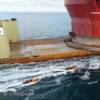Ballast Water Regulations Uniformity Plea to US Senate
A coalition of maritime related interests writes to US Senate pledging support for uniform national standard for regulation of ballast water & other vessel discharges.
The text of the letter addressed to The Hon. John D. Rockefeller IV Chairman Committee on Commerce, Science andTransportation, and to other Senate leaders, and signed by various coalition interests is as follows:
"We are writing to express support for Commerce, Science and Transportation Committee approval of S. 3332, the Vessel Incidental Discharges Act, bipartisan legislation that will help achieve the goal of a uniform national standard for the regulation of ballast water and other vessel discharges.
Our coalition—which includes U.S. and international vessel owners and operators; labor unions; industries that rely on marine vessels to transport essential cargoes in domestic and international commerce; marine terminals, and port authorities—applauds Senator Begich for introducing this legislation and offers its thanks to Chairman Rockefeller and Senator Hutchison for bringing it before the Committee.
Legislation to establish a consistent, practical, and science-based national standard for the management of vessel discharges is urgently needed. The maritime industry is currently contending with an inconsistent patchwork in which two federal agencies and more than two dozen states regulate ballast water and other vessel discharges in overlapping and sometimes contradictory ways.
If the current state of affairs is allowed to continue, the movement of essential maritime commerce will be constrained, placing American jobs in jeopardy, creating unnecessary inefficiencies in the U.S. transportation system and increasing the cost of moving both U.S. goods to market overseas and critical imports to U.S. manufacturers and consumers.
S. 3332 would help resolve the current untenable situation by putting into place a national ballast water treatment standard that has been determined by a panel of independent scientists to be the most stringent currently achievable.
Similar legislation—Title VII of H.R. 2838, the Coast Guard and Maritime Transportation Act of 2011—was passed with strong bipartisan support in the House of Representatives last fall.
The rigorous ballast water treatment standard set by both S.3332 and H.R. 2838 would eliminate the need for state regulations and ensure that vessel owners will install the most effective, commercially available ballast water treatment technologies to protect the marine environment of all the nation’s waterways.
Setting uniform national standards for regulation of ballast water and other vessel discharges is a top priority for the maritime industry, and we would urge all members of the Committee to support this legislation. Thank you for your consideration of our views. "













